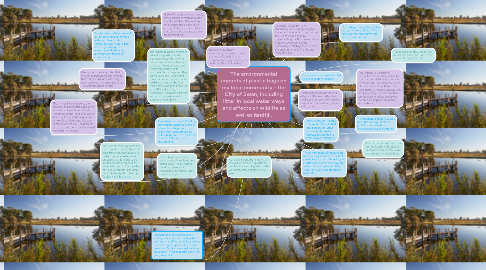The environmental impacts of plastic bags on my local community - the City of Swan, including litter in local water ways and affects on wildlife as well as landfill.
by brianna Jarvis

1. Australians contribute more than one million tonnes of plastic to landfill each year. A plastic bottle will completely degrade in 450 years.
2. The City of Swan are encouraging residents to limit their use of plastic in their everyday lives by promoting the challenge 'Plastic Free July.'
3. Boomerang Bags are creating an ecologically sound and sustainable environment. 273 communities around the world have implemented similar programs. The Boomerang Bags have prevented 47 million plastic bags from going to landfill.
4. The City of Swan supports the proposal to ban plastic bags in the local and statewide community. According to the 'Municipal waste Advisory Council', three quarters of litter identified along the W.A coastline are plastic. The problem of plastic pollution in W.A is one of the worst in Australia.
5. Australians use over 3.92 billion plastic bags each year and 3.76 billion plastic bags end up in landfill each year. Around 50 million bags end up in the litter streams of the Australian environment.
6. Marine life such as: whales, seals, birds and turtles mistake plastic bags for jellyfish. They end up entangled in the plastic bag or end up choking on them. Jellyfish and sea nettles are a sea turtle's predominant diet.
7. The indefinite period of time it takes for a plastic bag to degrade, causes detrimental impacts to wildlife as they are prone to inhaling plastic bags. As society continues to consume plastic bags and they continue to end up in landfill, more natural ecosystems and wildlife are lost. As the four billion plastic bags that end up in landfill and as they breakdown, the micro particles end up in the marine and terrestrial food chains.
8. Cleanup Australia identifies that only three percent of plastic bags from the four billion plastic bags used each year are being recycled. The rest ends up in landfill.
9. Plastic bags are causing environmental problems on a global scale. These include: flooding, depletion in resources and impacts upon climate change.
10. The City of Swan supports the ban of plastic bags in the local area. However, they believe in order to ensure sustainable practices that it needs to be implemented throughout the state; following in the footsteps of its counterparts, including: South Australia, ACT, Northern Territory and Tasmania.
11. The Boomerang Bags are made out of donated and recycled materials. Kalamunda, Roleystone and Victoria Park have begun using the environmentally-friendly alternatives in their local communities.
12. Councillor Cook from the Mundaring Shire is proposing for the local community to discontinue the use of plastic bags by implementing the Boomerang Bags Program. Volunteers in the community work together to make the environmentally friendly and reusable bags.
13. The Boomerang Bags focusses upon the damage of plastic pollution on the natural environment and ecosystems.
14. Plastic bags are the predominant debris of plastic pollution in the ocean off the W.A coast.
15. Plastic bags in the marine ecosystem are often mistaken for food causing detrimental impacts to marine life, including thousands of mammals and sea birds. The toxic nature of plastic bags as they are trapped by currents and float on the ocean surface are having detrimental impacts on marine ecosystems.
16. The environmental impact upon marine ecosystems as a result of plastic bags has a continual cycle. Plastic bags last between twenty and a thousand years and they travel long distances through air and water.
17. One third of turtles that come into the Sea Bird Hospital at Ballina are because they have been injured by plastic bags.
18. Marine biologist Dr Kathy Townsend highlights that forty percent of turtles that she finds dead in Moreton Bay are due to plastic bag consumption.
19. Shearwater chicks are being fed plastic bags from the nest.
20. Plastic bags cause detrimental effects to the sea turtle when swallowed due to choking, being caught in the intestinal system and toxicity.
21. Plastic bags that go to landfill or end up as litter pollution. This is because they breakdown into micro-sized pollution.


